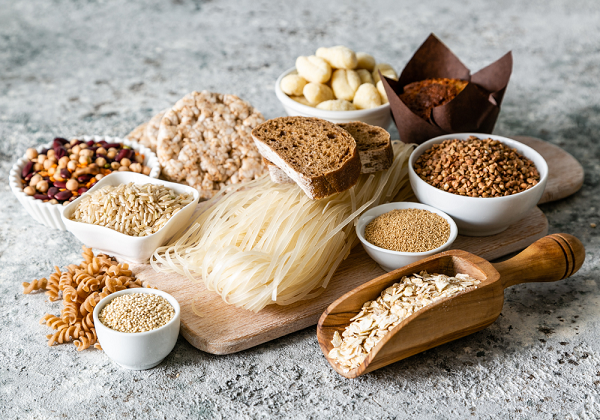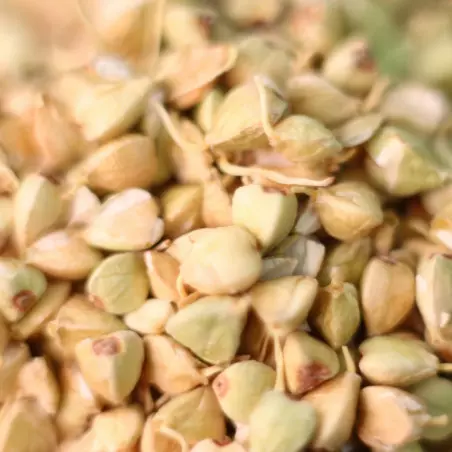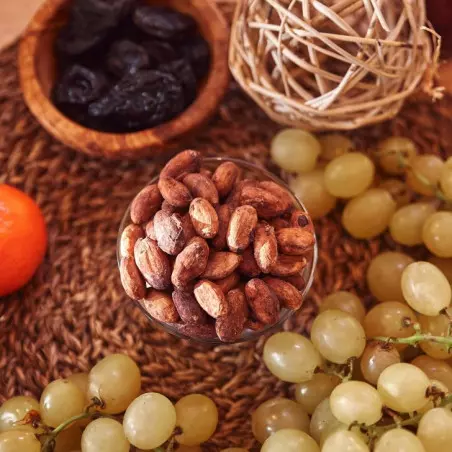What is the gluten ? ?
Le (The) gluten It is a protein binder composed of gliadin and glutenin, found in certain cereals such as wheat, oats, rye, and barley. These components trigger an immune reaction in people with celiac disease (an autoimmune intestinal disease).
This protein is responsible for the elastic and stretchable texture of dough in the making of bread and other baked goods.
Origin of the disease "du" translates to "of the" or "from the" in English, depending on the context. gluten It seems like your message is incomplete. Could you please provide the text you would like translated from French to English?
"La" disease "du" translates to "of the" or "from the" in English, depending on the context. gluten was first described in 1883, but its origin was still unknown. During the First World War, a team of Dutch doctors observed in individuals intolerant to gluten improvements and a disappearance of symptoms "when they were deprived of certain grains.".
In 1950, the gluten was officially recognized as responsible for the celiac disease which affects the abdominal viscera. In response to gluten, the immune system attacks the lining of the small intestine, causing inflammation and damage to this lining. This leads to gastrointestinal symptoms and can damage the nutrient absorption surface of the intestine. It is estimated today that one in 3000 people is affected by this chronic disease.
In the past, the outcome was fatal in one out of six cases. For the others, a certain level of habituation developed over time.
It looks like your message was cut off. Could you please provide the complete text you would like translated? gluten It seems like your message is incomplete. Could you please provide the text you would like translated from French to English?
Here are the various causes that may help explain intolerance to gluten It seems like your message is incomplete. Could you please provide the text you would like translated from French to English?
- The majority of wheat-based products currently come from refined grains that contain almost exclusively starch and gluten completely oxidized and therefore more difficult to assimilate. All the others nutrients necessary for their assimilation by our body (vitamins, minerals, polyunsaturated fatty acids, high biological value amino acids, enzymes or pro-enzymes) have been removed by refining.
- Moreover, the industrial processes aimed at obtaining very white and highly risen bread "mistreat" "the" gluten .. The ideal bread-making process should be done with a natural and spontaneous sourdough that develops significant acidity at the moment., (pH from 4 to 4.7), thus stimulating the enzyme phytase and accelerating the degradation of phytic acid. This is how the demineralizing nature of the flours wheat will be neutralized.
- In the wheat production process, enriching the soil with certain chemical fertilizers, as well as using phytosanitary products such as pesticides and herbicides, affects the quality of the proteins in the cereals thus produced.
- The selection of wheat varieties, increasingly concentrated in proteins Sure, I'd be happy to help! Please provide the text you would like translated from French to English. gluten It seems like there might be a typo or an incomplete text. Could you please provide the full text you would like translated? for industrial reasons, also has a harmful role.
- Currently, a large number of additives are permitted for bread production. Even enzymes obtained through genetic engineering are permitted.
- Some poisons or toxins, such as heavy metals introduced by food pollution or other sources (cadmium, lead, mercury, etc.), can take the place of certain co-enzymes (vitamins, trace elements, minerals) and block certain enzymes. Thus, poorly or undigested wheat protein will become toxic to the body.
For example, coumarin, an odoriferous substance of plant origin, can take the place of vitamin K in certain enzymes, thereby blocking their function. This is how rats and mice are eliminated, as certain enzymes involved in hemostasis have their functions blocked, causing the blood to become non-coagulable, which leads to death by internal hemorrhage.
How to detoxify the body from heavy metals ?
At the same time, the body can be detoxified from heavy metals through various biotherapies: phytotherapy, aromatherapy, enzymotherapy, rhythmic dieting, as well as the use of dietary supplements rich in vitamins, minerals, amino acids, enzymes, etc., pro- and prebiotics, polyunsaturated fatty acids, polyphenols. (pigments from fruits and vegetables) which help reduce intestinal inflammation, digestive disorders, and strengthen the mucosa.
What are the consequences of gluten intolerance or, more precisely, the incorrect digestion of gluten ?
According to the brilliant discoveries of the professor Karl L. Reichelt In Norway, if the digestion of this protein is done incorrectly, undesirable molecules or MIT (Toxic Intermediate Metabolite) such as gliadinomorphine or glutenmorphine, will be discovered. This peptide having an activity "opioid" at the level of brain receptors, may cause behavioral disorders such as: hypo- and hyperactivity, concentration or attention deficit, dyslexia, learning difficulties, lack of self-confidence, hypersensitivity, depression, schizophrenia, autistic traits, autism, epilepsy.
Moreover, in individuals with celiac disease, the ingestion of gluten can trigger malabsorption of nutrients, leading to atrophy of the intestinal villi and destruction of its mucosa. This reaction can result in food intolerance, with digestive symptoms such as chronic diarrhea, abdominal and muscle pain, and intestinal bloating. Additionally, specific symptoms related to this disease, such as iron deficiency anemia, joint pain, growth retardation, which can even lead to dwarfism, as well as chronic lack of energy and significant nervousness, may also manifest.
An appropriate dietary adjustment and a gluten-free diet can restore digestive functions and may contribute to spectacular results.
Foods to avoid in case of gluten intolerance:
- Wheat,
- oats,
- It seems like your message is incomplete. Could you please provide the full text you would like translated from French to English?rye
- and barley.
Vigilance is required; many food products can indeed contain it, such as spreadable cheeses, pâtés, cooked vegetables, fruit pastes, tube mayonnaise, ready-made sauces and soups, sausages, salami, etc. Be vigilant with industrial products, as many packaged foods contain gluten in the form of an additive or thickener.
What foods are allowed when you have a gluten allergy ?
Prefer gluten-free foods, especially rice, soy, corn (polenta), tapioca, potatoes, chestnuts, quinoa, ", the" buckwheat, millet, , the Tiger nut which can be beneficial for those who follow a gluten-free diet.
The tiger nut is a tuber that is very rich in nutrients and gluten-free, which can be used as is or in flour form. Its taste is slightly sweet and it has a very high fiber content. It is a very effective substitute for many food allergies.
These dietary products can help maintain a diet rich in essential nutrients while facilitating the assimilation of food. It is recommended to avoid purchasing pre-cooked foods, as they may contain gluten as an additive or hidden ingredient, which can compromise adherence to a strict gluten-free diet.
The quality of the wheat and the method of bread production can, in some cases, meet the needs of those who are intolerant to gluten. This is what an extraordinary artisan baker, Nicolas Supiot, suggests, as he uses only varieties of wheat from before the industrial era. (1850). It is indeed from this period that the hybridization of seeds begins, with the aim of adapting them to industrial processes, at the expense of their nutritional, taste, agronomic qualities, and vegetative vigor. Nicolas Supiot grinds his own wheat with a stone mill.
Some people who are intolerant to gluten consume its products, without showing any symptoms . .
What are the cheeses without gluten ? ?
The cheese belongs to the food products which can be partially consumed safely in case of intolerance to gluten. . Particularly when it is not processed, as is the case with natural cheeses and fresh natural cheeses, Cheese generally does not contain gluten, hence its good tolerance.
Be cautious with certain cheeses like Roquefort, processed cheeses, and blue cheeses, which may contain it to improve their texture. Always read the labels.
It looks like your sentence is incomplete. Could you please provide the full sentence so I can accurately translate it for you? gluten ? ?
At first glance, chocolate is not a food which contains gluten. . Indeed, its main ingredients are cocoa bean, cocoa butter, and sugar, which do not contain gluten. . But it is necessary to be careful, because during the manufacturing process, gluten It can be added. There are also tablets with inclusions, which may contain gluten.
Is there any gluten in the café ?
The coffee does not contain any gluten. .
That said, it is important to ensure that only hypoallergenic flavors are used for flavored coffees, because gluten can sometimes be found in certain artificial flavors used in the creation of flavored coffees (such as cappuccino, for example).
At Biovie, we offer you lupin coffee, a healthy alternative without caffeine and gluten.
Conclusion:
If you suffer from gluten intolerance and are concerned about the effects of this protein on your diet, it is essential to take measures to remove all gluten products from your diet, and that is where you will observe an improvement in the symptoms.
In parallel, you might consider implementing a protocol aimed at optimize your digestive capacity, notably by exploring methods such as a specific diet for irritable bowel syndrome or even a heavy metal detox protocol, which can help improve your well-being.
For all other people who tolerate gluten well, it is important to remember that you can consume it, but it is wise to do so in moderation, ensuring to maintain an overall balanced diet for better long-term health.














